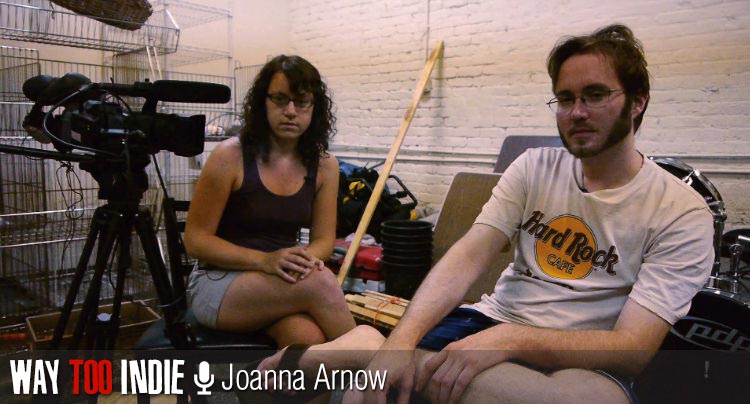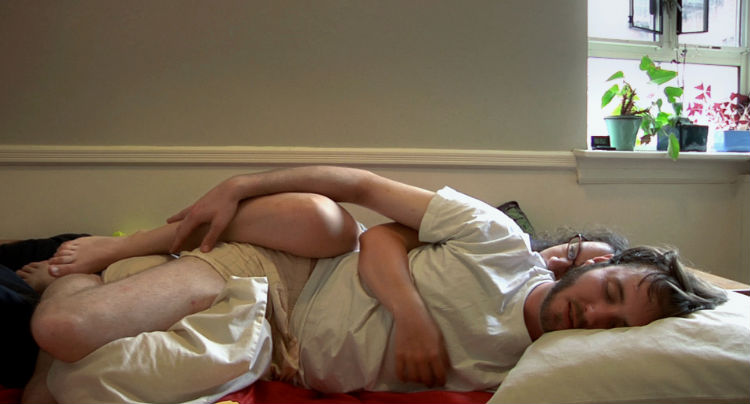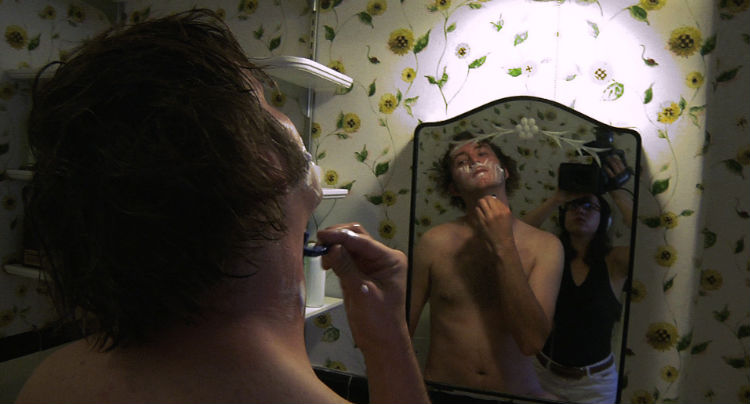Joanna Arnow Talks Baring All in “i hate myself :)” (SF Indiefest)

i hate myself 🙂 begins with New York filmmaker Joanna Arnow aiming her camera at her first boyfriend James, a crude, oft-drunk showman who enjoys screaming the n-word to a room of black people during open mic “performances”. He has a gift for rubbing people the wrong way, and he constantly pokes and prods at Joanna’s emotions and insecurities, almost to the point of abuse.
She evaluates, through the film, whether their relationship is a healthy one or not, but as she gets more wrapped up in the narrative herself (there’s a sex scene included that’s as explicit as it gets), the film evolves, and Joanna begins to point her camera at the filmmaking process itself. We see her sitting with her co-editor Max (who constantly nude on screen), and we even see her show the film to her parents and James, sex scene and all. It’s a multi-layered, complexly and intimately personal window into the soul of the woman behind the camera, and piercing look into the nature of shame and insecurity.
Joanna spoke with us in San Francisco during SF Indiefest about why people are drawn to James, turning the camera on herself part-way through production, how people have been reacting to the film, her experience in the indie world so far, and more. For more info, visit the film’s facebook page.
With this film, was your aim to break people out of their shells?
Joanna: The arc for me in this film is reflected in the title. I’m showing aspects of myself that are less socially acceptable, being open about them, and then coming to terms with them and seeing the humor in them. Hence the smiley face. It gives you a certain freedom. I hope that when people see the film they also feel like they can be more open.
The film is incredibly revealing. Were you planning to put yourself out there like that from the beginning?
Joanna: I think it was something that evolved along the way. When I started making it, I thought it was going to be a short film, but things ended up getting more complicated. I didn’t think I was going to be the main character in the story.
You thought James would be the main character.
Joanna: Yeah, and I thought the relationship was going to be more of a framework for telling James’ story. But then I changed a lot about the process and I wanted to include myself in the story as well. In telling a personal story, you run the risk of being self-indulgent. To avoid that, I had to be honest and willing to make myself look bad.
Do you think you look bad in the film?
Joanna: In places, but I think that’s a good thing. I think that it makes me look good that I look bad. (laughs) I don’t think it would have been good…okay, now I’m getting confused. (laughs)
No, I totally understand! There are a lot of layers to uncover as the film plays out. I could feel the evolution of the project as an audience member.
Joanna: I’m not in the beginning of the film that much, but once I realized that I wanted to get myself in the story later on in the process, it was tough because there wasn’t really a way to do that. I wasn’t in the footage enough to tell my part of the story unless we used an interview or voiceover, but both of those techniques felt a little too serious given the subject material. Max Karson, the co-editor, and I were having some great conflicts at the time, and I like the idea of telling my story in a conflict-driven way. I think it’s more dramatic and interesting, so that’s why I started filming the editing process. It also addressed the issue of how to include me in the story when I didn’t have the early footage.

James is magnetic, somehow. I felt a lot of uncomfortable emotions watching him, but I was listening close. What do you think it is about him that makes him draw people in?
Joanna: It’s his energy, his charisma, he’s a creative person. I guess it’s a lot of things. There’s never a dull moment with James. He’s very uncensored, and it’s an interesting ride.
What’s it like sitting in those rooms, watching his performances, and watching people react to what he’s saying?
Joanna: It’s very surreal. He says some things that you don’t normally hear, and it’s interesting to see people react. It was an interesting time. (laughs)
Do you think people should be more open, like James?
Joanna: (laughs) I think it depends on what they’re being open about!
It’s a fine line.
Joanna: It is a fine line. I think Max and James are provocative people who offend some people, and that’s something I admired about both of them. By including them in my film, I became provocative myself. That’s the transformation, and I wanted to emphasize that.
There’s an uncomfortable scene in which you show your parents the film, specifically one of the more risqué moments.
Joanna: I had been working on the film for several years, and it was very important to me. I thought I had to share it with the people that were most important to me. Keeping it from them would affect how I’d act in other areas of my life. I think that’s something every artist deals with at some point. I thought it was best to confront that issue. I think of the film as remolding my narrative and using the camera as a tool to do that. It’s important to show how the film is perceived in order to show the reconstruction of the narrative.
What was the first screening in front of a crowd like?
Joanna: It was so much fun. I’ve seen the footage so many times, so I’m really desensitized to it. To watch it with new eyes, new energy, and to hear people laughing, is really great.
I think it’s a very funny film.
Joanna: Oh yeah. I wanted it to be a funny film, and I think it is, but sometimes people feel sad for me. One of the challenges of making a film about yourself is imagining how others who don’t know you would see it. I would think the footage was funnier than other people would. I’d be laughing, and the audience would be horrified! (laughs) “This is so sad.” No! It’s funny! Don’t you understand? (laughs)
Do you have any filmic influences that inform your work?
Joanna: I have a weird influence that doesn’t come through in the film that much. I really wanted the film to be like All That Jazz by Bob Fosse. It’s an autobiographical film he made that follows how his relationships are entangled with the film he’s editing and the theater piece he’s directing, and it all falls apart. My film isn’t as much like that as I’d hoped, but they both show how life and narrative can be entangled with each other. I really like Caveh Zahedi’s documentaries, The Sheik and I and I Am a Sex Addict. They show how there are no rules in documentary filmmaking, and I admire him. I don’t know if it would have occurred to make the film this way had I not seen Ross McElwee’s films, especially Sherman’s March. I really like the idea of the character behind the camera, that subjective perspective.
What’s one of the most surprising reactions you’ve seen someone have to the film?
Joanna: One person seemed angry that I included the sex scene. That was interesting, to talk about the reasons I did and why I felt it was important. She felt very adamantly against it. My reasoning is that it’s an important part of the relationship. To me, one of the most beautiful things about documentary is that you get such great access, such a close view of someone else. In books and movies, what I’m looking for is getting a chance to see a side of someone that you don’t normally get to see. That side is what we normally think of as private or something that we’re ashamed of. It’s important to see that part.

What’s the most touching reaction someone’s had?
Joanna: People have been so positive. I like it most when people say they related and that it made them think about their own life. Someone I knew from school was telling me that they felt they needed to make some changes in their life, re-motivate, and think about their direction. I was so happy! I want this film to have a positive impact, although it’s a strange one! (laughs)
It’s strange, but hopefully with time it won’t be so strange!
Joanna: I hope so!
You’ve said that we live in a society where people live in shame.
Joanna: I feel like society has very specific expectations for how people are supposed to act and express themselves. People talk about sexuality more, but it’s still very taboo in many ways. Also, it’s still a very male-dominated conversation. I really see this as a feminist film as well.
Now that the film is done and you’re out in the festival scene, have you had a good experience so far operating in the independent film world?
Joanna: Yeah. I’ve been awed, time after time, by the generosity of people–filmmakers, curators, programmers–who take the time to see a first time filmmaker’s film and advocate for it. This film hasn’t gone into a huge number of festivals or any of the more mainstream ones, but the ones it’s gone into have been great.
What’s next?
Joanna: We will be distributing a film either through a distributor or by ourselves. We had a one day preview on No Budge, so that was a little taste of getting it out there digitally.
How do you feel about the digital market?
Joanna: Excited. There just seems to be endless possibilities. I like the idea that, if you make enough noise in a positive way, you can find an audience.
What’s your next movie going to be like?
Joanna: I’m still developing some documentaries, but I’m moving in a more narrative direction, and I’m working on scripts now. I have an actress in mind to work with for the next one, but she doesn’t know it yet. (laughs) It feels like I have a crush on someone and I haven’t told them yet.
